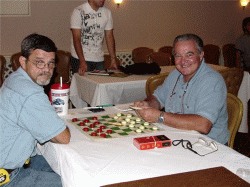The Checker Maven
The World's Most Widely Read Checkers and Draughts Publication
Bob Newell, Editor-in-Chief
Published every Saturday morning in Honolulu, Hawai`i
Noticing missing images? An explanation is here.
Let's Send Yunior and John to Prague!
Have you ever visited Prague's historic Tyrs House, in the Czech Republic?

Tyrs House is the home of the Czech Sokol Organization, and is a famed sport and conference venue. Throughout its long history it has played a major role in the Czech athletics scene. And now, coming up at Tyrs House from October 14 through October 16, is the 2005 World Youth Qualification Tournament, as part of a major checkers event which includes other qualification and world championship tournaments. It seems that the enlightened people of Czechoslovakia rank mind sports right alongside physical sports!


Yunior Lopez and John Post
Yunior Lopez and John Post are to represent the International Checker Hall of Fame, the American Checker Federation, and the United States in the Go-As-You-Please (GAYP) section of the World Youth Qualification Tournament--- if they can raise enough funds to be able to make the trip. The winner of this event may well be declared world youth champion, as reigning champion Clayton Nash has crossed over the age-21 barrier.
The competition is expected to be tough indeed, as the world's best young players contend for first place. But Yunior and John are no easy marks, and are expected to show well. Yunior began playing checkers in 2000 and played his first live over-the-board tournament in 2004. In addition, Yunior ably captained the American Internet Team, which this past spring played an historic electronic match with Great Britain.
John has an even longer record in the game, having attended US Nationals several times as well as playing in Arkansas state tournaments, and currently serves as president of the Arkansas State Checker Assocation.
But now Yunior and John need to raise at least $1,100 each for airfare, not to mention food, lodging, and incidental expenses. It's a costly proposition for these deserving young checkerists, and they need our help.
There are several ways to assist. You can donate directly to Yunior and John; you can contribute through the American Checker Federation Online Store; or you can purchase a US-Great Britain Internet Match Booklet from Yunior. John Post can be reached at 105 Evergreen Estates, Russellville AR, 72802. Yunior Lopez can be found at 1200 Declaration Drive, Las Vegas, NV 89110, and he is offering a match booklet to anyone who donates $15 or more. If you would rather contribute through the ACF, go to their online donation site and page down to Dream Young or Travel Fund.
Yunior summed it all up in an exclusive Checker Maven interview: "My experiences with checkers have been great and this is why I still play checkers. When you attend a live tournament it is something like no other. You are in a room with great people where you can have great conversations, great games, and overall a great time. We are ready to play!"
The Checker Maven asks you to give the future of checkers a real boost, by helping Yunior and John represent America in Prague this October.![]()

September 19, 2005 followup: We have learned that John Post unfortunately won't be able to make the trip to Prague.
Autumn is Coming On Fast

After you've worked out the answer, click on Read More to verify your solution. We're giving you a much easier problem after August's brain twisters.
By the way, we're desperately short of good speed problems (which is why we only have one today). We have a number of bad speed problems, but they won't do! If you have nice some favorites, please send them our way.
September Speed (fairly easy)
[Read More]School Bells Ring, and Children Sing ...

... it's back to checker school again!
Throughout the USA and Canada, and much of the western world, school bells are ringing and children are heading back to school after the long summer vacation. No doubt checker practice will quickly begin in earnest as all of the elementary school, middle school, and high school checker teams prepare for battle in the upcoming checker season.
It seems appropriate, then, that we continue our ongoing Checker School series with another installment from Ben Boland's classic Famous Positions. In this lesson, we'll look at Wardell's Position, which is akin to First Position, but the win is obtained without the winning side having "The Move." Unclear? Well, pay attention in class!
Red
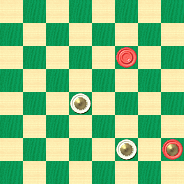
White
White to Play and Win
When you've tried the problem, click on Read More to see Mr. Boland's solution, a game run-up, and some great notes and commentary.
Extra (non-checker) points if you can give the source for "School Bells Ring and Children Sing" and quote the rest of the jingle.
[Read More]Did Marvin Blow the Game? (Conclusion)


Marvin J. Mavin and Jean Luc Tournevise
1. 11-15 22-18
2. 15x22 25x18
3. 12-16 29-25
4. 10-14 24-19
5. 16-20 25-22
6. 7-10 28-24
7. 8-12 32-28
8. 4-8 30-25
9. 3-7 18-15
10. 9-13 19-16
11. 12x19 23x16
12. 10x19 24x15
13. 8-12 15-11
14. 12x19 11-8
15. 7-10 8-3
16. 2-7
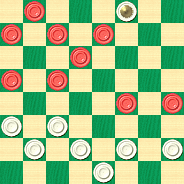
WHITE (Louie)
White to Play - Can White Win?
16. ... 27-24
17. 20x27 31x15
18. 10x19 3x17
"You sill-ee boy, did you not see zees ... how you say eet ... shot?'" he gloated after this move. "Maintenant, vous etes foutu!"
But the game continued this way:
19. 5-9 17-14
20. 9x18 22x15
21. 6-10 15x6
22. 1x10 25-22
23. 10-14 28-24
24. 19x28 26-23
25. 28-32 22-18
26. 32-27 18x9
27. 27x18 Red Wins!
"First Position, mon cher ami," said Marvin in a matter-of-fact manner. "Uh, in plain old American, you might just say, 'You lose, pal!'"
Louie treated Marvin to his best scowling glare. "I sim-plee cannot un-derstand eet!" he exclaimed. "Zis ligne - it is a no good way to play at Dames. Why I lose eet to zis clune americaine?"
"Ah, Frenchy," responded Marvin in a most politically incorrect manner, "you just gotta learn a little more checkers if you wanna beat Marvin. Ya wanted a draw, ya hadda play like this."
Marvin quickly reset the pieces to the original diagrammed position and played out these moves:
16. ... 3-8
17. 14-17 21x14
18. 10x17 27-24
19. 20x27 31x15
20. 17-21 8-12
21. 21x30 28-24
22. 30x23 15-11
23. 7x16 12x26 Drawn (White has a man-down draw).
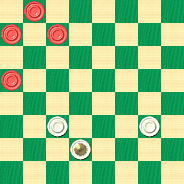
White
Red to Play, White to Draw
(Can you figure out the draw that Marvin and Louie think is so clear? Try it, then click on Read More below to see the solution.)
"Ya see, ya just hadda move your King away, and ya coulda got a nice man-down draw. But ya got a little too greedy fer yer own good," Marvin pontificated.
"Un moment, s'il vous plait," Louie cut in. "Per'aps I play eet 26-22 at move 22 and I will not 'ave zees First Postion of yours?"
"Nah, Louie, that ain't right neither. Lookit...." Marvin replied. He set the pieces back to the original diagrammed position one more time and showed the following play.
16. ... 27-24
17. 20x27 31x15
18. 10x19 3x17
19. 5-9 17-14
20. 9x18 22x15
21. 6-10 15x6
22. 1x10 26-22
23. 10-14 22-18
24. 14x23 25-22
25. 23-27 22-18
26. 27-31 18-14
27. 31-27 14-9
28. 27-23 9-6
29. 19-24 28x19
30. 23x16 6-2
31. 16-11 2-6
32. 11-15 6-9
33. 15-18 Red Wins.
"Zut!" cried Louie. "Encore une fois ... it ees zee First Position! Monsieur Marvin, you make zee connerie on Jean Claude Louis!"
"Louie," Marvin replied, "Face it. Ya just wasn't good enough to outsmart ole Marvin J. Mavin. Now c'mon, let's go across the street and I'll buy ya une biere in the name of amitie internationale!"

Well, whether you yourself solved this one or not, you've also surely earned yourself une biere for trying. We hope you enjoyed looking into this fascinating and instructive position. There is much more to it than we have space to present here, so grab that beer, and use your computer to explore the variant lines.
And, we're pleased to say, our hero Marvin did not blow the game!
French-English Glossary:
maintenant vous etes foutu now you are finished
mon cher ami my dear friend
ligne line, as in "line of play"
Dames French name for checkers, though more often referring to international rules
clune americaine American clown
un moment s'il vous plait one moment if you please
zut drat
connerie best translated here as "trickery"
encore une fois once again
une biere a beer
amitie internationale international friendship
(Accent marks have been omitted throughout. --Ed.)
[Read More]It's Your Turn Once Again

The very popular It's Your Turn online play site suffered a serious meltdown on Friday, August 19, 2005. This site, highly rated and highly recommended on our site ratings page, hosts turn-based play, counts among its membership many top-notch players, and offers a number of checker tournaments every month.
Due to a faulty backup strategy, both main files and backups were lost, and the site suffered a 10 day outage before coming back on-line on August 29, 2005. Site operator Patrick Chu spent quite a bit of money to hire a data recovery service, and they did their job well: everything except game moves was fully recovered from the crashed storage devices.
During the crisis, site management provided frequent informational updates. and presented a balanced and forthright viewpoint. They have "confessed" to less-than-stellar business practices vis-a-vis backup and recovery, and have offered to make good on lost membership time due to the site outage.
It's Your Turn has been a great place to play both casual and serious checkers, and members now have a choice: they can castigate Mr. Chu for his faults, and abandon the site; or they can realize that It's Your Turn remains a good place to find a good game.
We ourselves have been critical in the past of the site's unfortunate lack of attention to customer service. We expect that this recent experience may have turned that situation around.
It is our hope, and our recommendation, that if you are a checker-playing member of It's Your Turn, you will stay on as a member and keep playing. There is a real danger of the site losing enough membership to cause serious harm. We would surely not wish to see that happen.
The 2005 ACF 9th District Tournament
The first three days of August saw unusual action in the gaming rooms of the Four Queens in Las Vegas, Nevada.

No, we're not talking about Blackjack or Texas Hold'Em, though we're sure there was plenty of action of that type elsewhere in the casino.
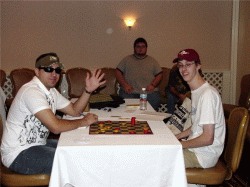
Nery Cardenas and Ryan Pronk; Tom Jones and John Cardie
We're talking about the 2005 edition of the American Checker Federation 9th District Tournament, organized by California checker stalwart Gerry Lopez. A small but enthusiastic group of players gathered in the City of Entertainment for some serious cross-board action.
Competition took place in two divisions, with these final results:
A Division
| Ranking | Name | State | Points | Remarks |
|---|---|---|---|---|
| 1. | Gerry Lopez | CA | 10 | 2005 Cal. and Dist. 9 Champion |
| 2. | Nery Cardenas | CA | 8 | |
| 3. | Ryan Pronk | AZ | 4 | withdrew |
| 4. | Bob Murr | CO | 2 |
B Division
| Ranking | Name | State | Points | Remarks |
|---|---|---|---|---|
| 1. | John Gibson | CA | 20 | |
| 2. | Alex Lopez | CA | 18 | first tourney |
| 3. | John Cardie | CO | 16 | first tourney |
| 4. | Robert Ferguson | UT | 14 | first tourney |
| 5. | Tom Jones | NV | 8 | first tourney |
| 6. | Paul Stein | CA | 4 | |
| 7. | Joe Coleman | IA | 2 |
Division A Game 1
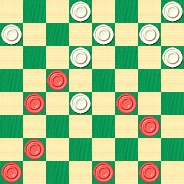
Red
Position at Note B, Red to Play and Draw
| [Event "9th District 2005 Round 2 Game 1"] | |
| [Date "2005-08-01"] | |
| [Red "Ryan Pronk"] | |
| [White "Bob Murr"] | |
| [Result "0-1"] | |
| 1. 11-16 23-18 | 2. 7-11 26-23 |
| 3. 3-7 30-26 | 4. 16-19 (A) 23x16 |
| 5. 12x19 24x15 | 6. 10x19 27-24 |
| 7. 7-10 24x15 | 8. 10x19 32-27 |
| 9. 9-14 18x9 | 10. 5x14 27-23 |
| 11. 11-16 22-18 | 12. 6-9 18-15 |
| 13. 8-12 (B) 25-22 | 14. 16-20 23x16 |
| 15. 12x19 15-11 | 16. 20-24 22-17 |
| 17. 14-18 26-22 | 18. 18x25 29x22 |
| 19. 19-23 28x19 | 20. 9-13 17-14 |
| 21. 23-26 (D) 19-15 (E) | 22. 26-30 22-18 |
| 23. 30-25 14-10 | 24. 25-22 10-7 |
| 25. 4-8 11x4 | 26. 2x11 15x8 |
| 27. 22x15 8-3 (F) | 28. 15-11 31-26 |
| 29. 1-6 26-22 | 30. 11-15 4-8 |
| 31. 15-10 8-11 | 32. 10-14 3-7 |
White wins.
(A) 9-14 would be an alternative here but there is nothing wrong with the actual move.
(B) The losing move. 1-5 should have held the game.
(C) King's Row prefers 1-6 here, but the game is still lost for Red.
(D) Again, KR prefers 1-5 here ...
(E) ... and 22-18 here, but the outcome won't change.
(F) There is little left to say, or play.
Annotations from King's Row.
Division A Game 2
Notes by Ryan Pronk
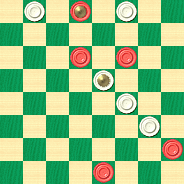
Red
Position at Note G, Red to Play and Draw
| [Event "9th District 2005 Round 1 Game 1"] | |
| [Date "2005-08-01"] | |
| [Red "Ryan Pronk"] | |
| [White "Nery Cardenas"] | |
| [Result "1/2-1/2"] | |
| 1. 11-16 21-17 | 2. 9-14 (A) 17-13 (B) |
| 3. 16-19 (C) 23x16 | 4. 12x19 24x15 |
| 5. 10x19 25-21 | 6. 8-11 27-23 |
| 7. 6-10 23x16 | 8. 11x20 26-23 (D) |
| 9. 14-17 (E) 21x14 | 10. 10x26 31x22 |
| 11. 4-8 22-18 | 12. 8-11 29-25 |
| 13. 7-10 25-22 | 14. 10-14 18x9 |
| 15. 5x14 22-18 | 16. 14-17 23-19 |
| 17. 17-22 13-9! | 18. 1-5 (F) 18-14 |
| 19. 20-24 19-16 | 20. 11x20 28x19 |
| 21. 20-24 19-16 | 22. 3-7 16-12 |
| 23. 7-11 12-8 | 24. 11-15 8-3 |
| 25. 15-18 3-8 | 26. 18-23 8-11 |
| 27. 24-27 11-15 | 28. 27-31 15-18 (G) |
| 29. 22-26 18x27 | 30. 31x24 30x23 |
| 31. 24-27 23-18 | 32. 27-23 18-15 |
| 33. 23-18 15-11 | 34. 18-22 |
Drawn.
(A) A 3-move opening that usually transposes into
Pioneer lines.
(B) Regarded as inferior because it allows the
powerful 16-19 dyke. Going into Pioneer lines with
25-21 is best. However, if the opening were 12-16,
21-17, 9-14, then this 17-13 (as preferred by Tinsley)
would be best.
(C) Planting the piece on 19, and making for a strong
game - but not in this case!
(D) Really took me by surprise. I was expecting 22-17
which may give white a stronger game. But as they
say, the element of surprise is sometimes good enough
to win!
(E) Is there anything better than this natural move?
(F) Again the previous move really took me by
surprise, but after this 1-5, I could see to the end
of the game.
(G) A nice problem setting for the beginner.
Division B Game 1
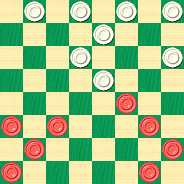
Red
Position at Note E, Red to Play and Draw
| [Event "9th District 2005 Round 6 Game 1"] | |
| [Date "2005-08-02"] | |
| [Red "Robert Ferguson"] | |
| [White "John Cardie"] | |
| [Result "0-1"] | |
| 1. 10-14 22-18 | 2. 11-15 18x11 |
| 3. 8x15 24-19 | 4. 15x24 28x19 |
| 5. 7-11 25-22 (A) | 6. 3-8 (B) 22-18 (C) |
| 7. 6-10 19-15 | 8. 10x19 23x7 |
| 9. 2x11 27-23 (D) | 10. 1-6 (E) 29-25 (F) |
| 11. 6-10 (G) 25-22 | 12. 12-16 22-17 |
| 13. 9-13 18x9 | 14. 5x14 23-18 |
| 15. 13x22 18x9 | 16. 22-25 9-6 |
| 17. 25-29 21-17 | 18. 8-12 6-2 |
| 19. 10-15 17-14 | 20. 15-19 2-6 |
| 21. 4-8 14-10 | 22. 19-23 26x19 |
| 23. 16x23 10-7 | 24. 12-16 7-3 |
| 25. 8-12 3-8 | 26. 11-15 8-11 |
White Wins.
(A) 23-18 would be better here.
(B) 4-8 is stronger; KR thinks 3-8 is quite weak.
(C) 29-25 is better but White already has a strong game.
(D) This moves blows away the win! 29-25 would have won easily.
(E) But Red misses the chance! 14-17 would have drawn.
(F) White gives Red another shot at a draw! 26-22 would have won here.
(G) And for the last time, Red misses the chance to draw with 14-17. Beyond this point there are some sub-optimal moves on both sides, but Red is lost no matter.
Annotations from King's Row.
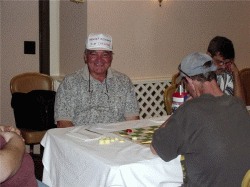
John Cardie, Winning!
The Checker Maven congratulates Gerry Lopez for not only having organized this event, but taking home the District 9 and California championships!

Champion Gerry Lopez
Our thanks to Bob Murr for photos and games, Ryan Pronk for additional games, and Gerry Lopez for permission to publish.
Eyes Only


WHITE
White to Play and Win
When you either have the solution, or have had enough, click on Read More to learn the winning way.
[Read More]A Little Summer Housekeeping

Also, our on-line publication calendar has gotten out-of-date. Look for us to get that fixed up within the next week or so.
Thank you for helping to make The Checker Maven one of the world's most-read checker publications.
Leo Is On The Team!
The Checker Maven is pleased to note that, following a period of controversy (see our previous editorial on this topic), eminent checker grandmaster Leo Levitt will be playing for the USA in the upcoming 100th Anniversary International Match with Great Britain.

Congratulations and thanks are due all around to those who in the end upheld the best principles of our game. We recall Dr. Martin Luther King's famed expression, "It's always the right time to do the right thing" and we are proud that our ACF leaders did exactly that.... the right thing.

Faster Than a Speeding --- Turtle?
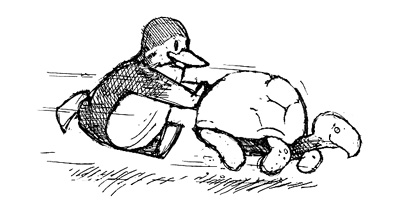
Toe up to the starting line and click below to display the problems and start the clock. Good luck! You can check your solutions by clicking on Read More. Afterwards, click here to cast your vote for the type of speed problems you prefer.
(This article has been edited subsequent to original publication due to valuable reader input. As a result you have three problems instead of two!)
Problem One (very hard for a timed problem)
Problem Two (medium difficulty, original erroneous diagram corrected)
Problem Three (quite hard, as originally published)
[Read More]The Checker Maven is produced at editorial offices in Honolulu, Hawai`i, as a completely non-commercial public service from which no profit is obtained or sought. Original material is Copyright © 2004-2025 Avi Gobbler Publishing. Other material is public domain, as attributed, or licensed under Creative Commons. Information presented on this site is offered as-is, at no cost, and bears no express or implied warranty as to accuracy or usability. You agree that you use such information entirely at your own risk. No liabilities of any kind under any legal theory whatsoever are accepted. The Checker Maven is dedicated to the memory of Mr. Bob Newell, Sr.
